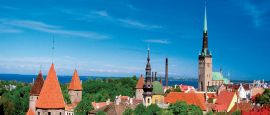All the winding cobbled streets in Tallinn lead onto the Raekoja plats (Town Hall Square), which is dominated by the imposing facade of the Raekoda (Town Hall). The building was constructed in the 14th and 15th centuries and is the only surviving late Gothic town hall in Northern Europe. Its soaring steeple bears a 16th-century weathervane portraying 'Old Thomas', the guardian of the city. Open-air concerts are held here in summer and its many cafés and eating places make it a bustling meeting place for both tourists and Tallinners alike.
Things to see in Tallinn
Tourist offices
Address: Niguliste 2, City Centre, Tallinn, 10146, Estonia
Tel: +372 645 7777.
Opening Hours:
Mon-Sat 0900-1700, Sun 1000-1500 (Jan-March)
Mon-Sat 09100-1800, Sun 0900-1600 (Apr-May)
Mon-Sat 0900-1900, Sun 0900-1800 (Jun-Aug)
Mon-Sat 09100-1800, Sun 0900-1600 (Sep)
Mon-Sat 0900-1700, Sun 1000-1500 (Oct-Dec)
www.visittallinn.eeThe tourist office is open daily. Come here for Tallinn Cards, free maps and walking tours.
Tallinn's UNESCO-listed old quarter is one of the most attractive in Europe and it is easy to see why it has been dubbed a 'mini Prague'. Boasting pretty cobbled streets, a smattering of museums and plenty of peaceful squares, it's easy to spend hours simply wandering around. Buildings that were badly damaged during WWII and the Cold War have been lovingly renovated, and the Old Town now boasts cafés, restaurants, hotels and touristy shops.
Occupying a quaint old building within the Old Town, the Tallinn City Museum takes you on a whistle-stop tour through the city's lengthy and fascinating history. Starting with the earliest days of the city, it swiftly hustles visitors through to the German and then Soviet occupations and contains scores of artefacts and photographs arranged in easily comprehensible clusters. But it isn't all about ancient history, Estonia's recent post-independence years also get a look in and are brilliant for anyone who doesn't know much about the country.
Designed by Finnish architect Pekka Vapaavuori, Kumu is the striking main building of the Art Museum of Estonia and is famous for the contents. An impressively high-tech facility, it serves both as a national gallery and a contemporary art museum. While you won’t find many of the Great Masters here, there are plenty of Estonian classics, as well as a carefully-curated series of contemporary pieces. The Kumu is located next to Kadriorg Park and near Kadriorg Palace.
The unflatteringly named Paks Margareeta (Fat Margaret) might, if you squint, resemble a seated full-figured lady, but this tower's real purpose was considerably less benign than the name suggests. Part of a network of defensive structures facing out over the sea towards Finland, Paks Margareeta was built in the early 16th century and got its name, depending on who you listen to, from a large cannon or a chubby cook who worked there. Today, it houses the Estonian Maritime Museum that charts the history of Estonia's lengthy sea-faring past. Not that it is all navy cannons and elaborate ships' prows - one of the most touching exhibits is a set of Neolithic fishing gear.
Tallinn’s history includes wave after wave of occupation, with sovereignty ping-ponging back and forth between Germany and Russia. However, neither the Tsars nor the crusaders proved as lethal to the locals as the Nazis and the Soviets who followed. As a result, the dark days of both occupations have been given their own museum, which brings those years chillingly back to life. Old uniforms, photos and audio-visual displays illuminate the tortuous decades of oppression and privation that Estonia endured before the country eventually managed to win independence from the Soviet Union in 1991.
Dominating the Toompea hillside, this striking orthodox cathedral is crowned by instantly memorable black onion domes. Despite looking as though it has been in situ for centuries, the cathedral was actually commissioned by Tsar Alexander III, first opening its doors in 1900. Inside, it is an elaborate labyrinth of gold gilt and lavish frescoes and also houses an impressive collection of icon paintings.
Built in 1712, this striking Russian Orthodox Church is the oldest wooden structure in Tallinn and remains in surprisingly good shape. Built in the wake of the Great Northern War which saw Estonia pass into Russian hands for the umpteenth time, the church was designed to cater for the increasing number of Russian émigrés then making their home in the city. Today, it still fulfils that function and although the Soviet Union is gone, worshippers still belong to the Moscow patriarchate.
Despite its name, which translates as 'Peek into the Kitchen', there’s not much of a culinary bent to see during a visit to Kiek de Kok. Instead, the former defensive tower, which was given its nickname thanks to its loftiness (enabling soldiers living there to peer into the kitchens of the Old Town houses below), is packed with military artefacts as well as a top-floor café and an art gallery. Beneath it is a network of defensive tunnels that extend out into Toompea Hill below. Since being built in the 1470s, the tower has been called into action on numerous occasions, not least during Ivan the Terrible’s assault in the late 1500s.
Tallinn's answer to Pere Lachaise in Paris or Copenhagen's Assistens Kirkegård, the beautiful Metsakalmistu is easily Estonia's most famous cemetery. Dotted with towering fir trees, it houses the earthly remains of some of the country's most famous names, among them writer Eduard Vilde and Estonia's first president, Konstantin Pats. Established in 1933, it nevertheless has a slightly Gothic feel thanks to the odd tumbledown gravestone and the overarching firs. Other big name inhabitants worth looking out for as you wander its shady paths include poet Lydia Koidula, writer Anton-Hansen Tammsaare and chess champion Paul Keres.
Do you have any Feedback about this page?
© 2026 Columbus Travel Media Ltd. All rights reserved. No part of this site may be reproduced without our written permission, click here for information on Columbus Content Solutions.








 You know where
You know where